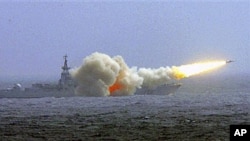The Chinese government has downplayed its maritime disputes with its neighbors in the region, although maintaining its sovereignty over islands in the East and South China Seas that are also claimed by other countries in the region.
When China recently released its biennial defense white paper, it was clear that the country’s number one maritime security issue is Taiwan, a separately-governed island that Beijing considers part of Chinese territory.
One maritime issue that got little attention, though, was the contested islands around China.
In the South China Sea, there are the Spratly and Paracel islands. The Spratlys are largely rocky shoals which are claimed by Brunei, China, Malaysia, the Philippines, Taiwan and Vietnam. The Paracels, a smaller island group, are claimed by China, Taiwan and Vietnam.
In the East China Sea, China and Japan disagree strongly about who owns the islands that the Chinese call the Diaoyu and the Japanese call the Senkaku.
The islands are near key shipping lanes and important commercial fishing areas. But, more importantly, they are believed to sit astride large oil deposits.
Gabe Collins is a commodity specialist with the analytical website, China SignPost. He says he thinks China’s thirst for energy is one important explanation for its interest in maintaining sovereignty over the islands.
"Each barrel of oil that you can produce from your own adjacent offshore regions is at least ideally one less barrel that you have to import from somewhere else,” Collins states.
Collins points out that China’s onshore oil production is starting to decline and that the country will soon need to look elsewhere.
"But I think in the coming years, as onshore production continues to plateau, if things geologically do pan out for the Chinese and their offshore exploration and production, I think you are going to see offshore oil and gas production rise as a percentage of the total in China over the next five to 10 years," he said.
Another major reason for China’s strong claims for the disputed islands has to do with national pride. Li Mingjiang, a political science professor at Singapore’s Rajaratnam School of International Studies, says this feeling has to do with recent history - when China felt Western powers were taking advantage of it.
"And, this of course is related to the so-called century of humiliation. And, many Chinese feel that in the past, China was weak and it was not able to control or compete with other powers in the South China Sea to protect China’s interests,” Li said. “But now it is getting stronger and so it is time to protect its interests."
These two interests are highlighted in all official Chinese pronouncements on the subject. Chinese Foreign Ministry spokeswoman Jiang Yu last month was asked China’s position on Philippine oil exploration in the disputed Spratly area.
Jiang says China owns indisputable sovereignty over the Nansha Islands, which is what the Chinese call the Spratlys.
She says oil and gas exploration activities by any country or company in waters under China's jurisdiction, without permission of the Chinese government, constitutes violation of China's sovereignty, rights and interests. She says China considers such actions illegal.
Many other countries are closely watching the Chinese navy’s actions.
Admiral Robert Willard, commander of U.S. Pacific Command, last week told a House of Representatives committee that, although confrontations between American and Chinese ships have been rare, there is still some reason to be concerned.
“The Chinese do continue to shadow some of our ships as they conduct their missions in international waters that are approximate to China,” Willard said. “The confrontations that have occurred have occurred with our partners and allies in the region."
He pointed to recent incidents with Japan about the Senkaku or Diaoyu Islands, and with a Philippine ship in the South China Sea.
The United States sparked some controversy in the region in July when Secretary of State Hillary Clinton said Washington thinks the claimants should pursue their territorial claims in accordance with the United Nations’ Convention on the Law of the Sea.
Singaporean professor Li says these comments worried China. He says Beijing is seeking to resolve the territorial disputes bilaterally, because it feels it has a better chance of working things out in its favor.
"Right now, China does not control some of the major islands in the Spratly Islands, and many clauses of the U.N. Convention of the Sea are not favorable for China, as well. So there is fear on the part of China that China might end up losing a lot of things in the South China Sea, if the dispute is submitted to international arbitration," Li explains.
Li says he thinks countries in Southeast Asia were happy, to a point, to see the United States involve itself in the South China Sea maritime dispute. But he says, because all of the countries in the region are so economically dependent on China, they also do not want to be forced to take sides.




